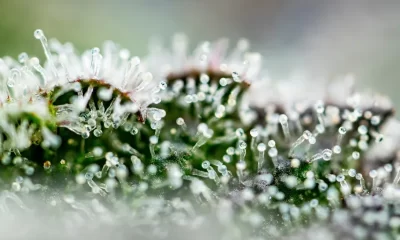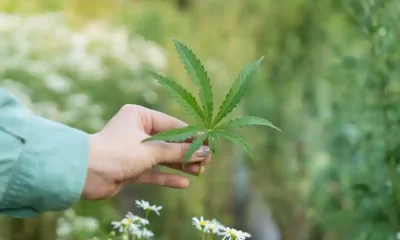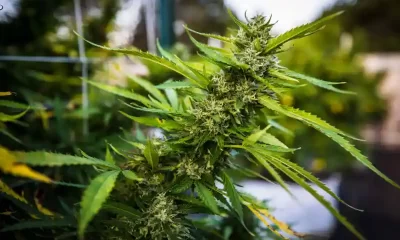Business
DEA States that Delta-9-THCO, Delta-8-THCO Are Not Hemp

A recent letter reveals that the DEA doesn’t view delta-9-THCO and delta-8-THCO as hemp, and instead are considered to be controlled substances.
In an email response sent to Rod Kight of Kight Law Office PC on Feb. 13, the Drug Enforcement Administration (DEA) stated that because delta-9-THCO and delta-8-THCO are synthetic and are not found naturally in cannabis, they do not count as hemp, and are therefore controlled substances.
Kight’s letter was originally sent in August 2022 (and a follow-up email sent last week on Feb. 7) with a request for the status of THC acetate ester (THCO) under the Controlled Substances Act (CSA).
Terrence L. Boos, Chief Drug & Chemical Evaluation Section Diversion Control Division penned the response, and clarified the agency’s stance on delta products. “The only substances of which the Drug Enforcement Administration (DEA) is aware of the THC acetate ester are delta-9-THCO (delta-9-THC acetate ester) and delta-8-THCO (delta-8-THC acetate ester),” Boos said. “The Drug Enforcement Administration (DEA) reviewed the CSA and its implementing regulations with regard to the control status of these substances.”
Boos explained that the CSA classifies “tetrahydrocannabinols,” or THC, as “naturally contained in a plant of the genus Cannabis (cannabis plant), as well as synthetic equivalents of the substances contained in the cannabis plant and/or synthetic substances, derivatives, and their isomers with similar chemical structure and pharmacological activity to those substances contained in the plant.”
Because of this definition, neither delta-9-THCO or delta-8-THCO are considered to be hemp by the DEA. “Delta-9-THCO and delta-8-THCO do not occur naturally in the cannabis plant and can only be obtained synthetically, and therefore do not fall under the definition of hemp,” wrote Boos.
He added that delta-9-THCO and delta-8-THCO have “similar chemical structures and pharmacological activities to those contained in the cannabis plant,” and thus meet the definition of “tetrahydrocannabinols,” which the agency classifies in Schedule I. He also included the molecular structure of delta-9-THCO and delta-8-THCO for reference at the end of the letter.
In a written statement from Michelle Bodian, a partner at Vicente Sederberg, Bodian explained what this news could mean for the industry. “While the latest statement from DEA does not clarify the legal status of all novel hemp derived cannabinoids, it does clarify that DEA believes Delta-9THCO and Delta-8THCO are controlled substances,” said Michelle Bodian, Partner at Vicente Sederberg. “Hopefully, there is Congressional action soon to address the legality of all hemp derived cannabinoids, so the industry is not left with a patchwork of law, regulation, policy and now, letter statements.”
While the government has been silent on a definitive course of action in regard to regulating delta products, state legislators have been left to take action on their own.
Delta-8 products were banned in New York in May 2021. Ohio created new rules to govern delta-8 products in June 2021, including production and sales. A new law introduced in Michigan in July 2021 also created regulations that limited the sale of delta-8 products to only cannabis businesses that were licensed by the Michigan Marijuana Regulatory Agency. Later in November 2021, a Texas judge issued a temporary injunction that removed delta-8 from the state’s list of Schedule I substances.
In May 2022, governmental agencies such as the Food and Drug Administration (FDA) sent out warning letters to businesses selling delta-8 products. “The FDA is very concerned about the growing popularity of delta-8 THC products being sold online and in stores nationwide,” said FDA Principal Deputy Commissioner Janet Woodcock. “These products often include claims that they treat or alleviate the side effects related to a wide variety of diseases or medical disorders, such as cancer, multiple sclerosis, chronic pain, nausea, and anxiety.”
In the most recent string of delta-related news, Connecticut Attorney General William Tong recently announced that his office was suing five retailers selling cannabis without a license, specifically in relation to delta-8 THC. “Cannabis products in Connecticut cannot be sold by unlicensed retailers and must meet rigorous testing and packaging requirements. Period,” said Tong in a statement. “Any unlicensed Connecticut retailer selling delta-8 THC products that purport to contain high levels of THC is breaking the law and may be subject to both criminal and civil penalties.”
Source: https://hightimes.com/news/dea-states-that-delta-9-thco-delta-8-thco-are-not-hemp/
Business
New Mexico cannabis operator fined, loses license for alleged BioTrack fraud

New Mexico regulators fined a cannabis operator nearly $300,000 and revoked its license after the company allegedly created fake reports in the state’s traceability software.
The New Mexico Cannabis Control Division (CCD) accused marijuana manufacturer and retailer Golden Roots of 11 violations, according to Albuquerque Business First.
Golden Roots operates the The Cannabis Revolution Dispensary.
The majority of the violations are related to the Albuquerque company’s improper use of BioTrack, which has been New Mexico’s track-and-trace vendor since 2015.
The CCD alleges Golden Roots reported marijuana production only two months after it had received its vertically integrated license, according to Albuquerque Business First.
Because cannabis takes longer than two months to be cultivated, the CCD was suspicious of the report.
After inspecting the company’s premises, the CCD alleged Golden Roots reported cultivation, transportation and sales in BioTrack but wasn’t able to provide officers who inspected the site evidence that the operator was cultivating cannabis.
In April, the CCD revoked Golden Roots’ license and issued a $10,000 fine, according to the news outlet.
The company requested a hearing, which the regulator scheduled for Sept. 1.
At the hearing, the CCD testified that the company’s dried-cannabis weights in BioTrack were suspicious because they didn’t seem to accurately reflect how much weight marijuana loses as it dries.
Company employees also poorly accounted for why they were making adjustments in the system of up to 24 pounds of cannabis, making comments such as “bad” or “mistake” in the software, Albuquerque Business First reported.
Golden Roots was fined $298,972.05 – the amount regulators allege the company made selling products that weren’t properly accounted for in BioTrack.
The CCD has been cracking down on cannabis operators accused of selling products procured from out-of-state or not grown legally:
- Regulators alleged in August that Albuquerque dispensary Sawmill Sweet Leaf sold out-of-state products and didn’t have a license for extraction.
- Paradise Exotics Distro lost its license in July after regulators alleged the company sold products made in California.
Golden Roots was the first alleged rulebreaker in New Mexico to be asked to pay a large fine.
Source: https://mjbizdaily.com/new-mexico-cannabis-operator-fined-loses-license-for-alleged-biotrack-fraud/
Business
Marijuana companies suing US attorney general in federal prohibition challenge

Four marijuana companies, including a multistate operator, have filed a lawsuit against U.S. Attorney General Merrick Garland in which they allege the federal MJ prohibition under the Controlled Substances Act is no longer constitutional.
According to the complaint, filed Thursday in U.S. District Court in Massachusetts, retailer Canna Provisions, Treevit delivery service CEO Gyasi Sellers, cultivator Wiseacre Farm and MSO Verano Holdings Corp. are all harmed by “the federal government’s unconstitutional ban on cultivating, manufacturing, distributing, or possessing intrastate marijuana.”
Verano is headquartered in Chicago but has operations in Massachusetts; the other three operators are based in Massachusetts.
The lawsuit seeks a ruling that the “Controlled Substances Act is unconstitutional as applied to the intrastate cultivation, manufacture, possession, and distribution of marijuana pursuant to state law.”
The companies want the case to go before the U.S. Supreme Court.
They hired prominent law firm Boies Schiller Flexner to represent them.
The New York-based firm’s principal is David Boies, whose former clients include Microsoft, former presidential candidate Al Gore and Elizabeth Holmes’ disgraced startup Theranos.
Similar challenges to the federal Controlled Substances Act (CSA) have failed.
One such challenge led to a landmark Supreme Court decision in 2005.
In Gonzalez vs. Raich, the highest court in the United States ruled in a 6-3 decision that the commerce clause of the U.S. Constitution gave Congress the power to outlaw marijuana federally, even though state laws allow the cultivation and sale of cannabis.
In the 18 years since that ruling, 23 states and the District of Columbia have legalized adult-use marijuana and the federal government has allowed a multibillion-dollar cannabis industry to thrive.
Since both Congress and the U.S. Department of Justice, currently headed by Garland, have declined to intervene in state-licensed marijuana markets, the key facts that led to the Supreme Court’s 2005 ruling “no longer apply,” Boies said in a statement Thursday.
“The Supreme Court has since made clear that the federal government lacks the authority to regulate purely intrastate commerce,” Boies said.
“Moreover, the facts on which those precedents are based are no longer true.”
Verano President Darren Weiss said in a statement the company is “prepared to bring this case all the way to the Supreme Court in order to align federal law with how Congress has acted for years.”
While the Biden administration’s push to reschedule marijuana would help solve marijuana operators’ federal tax woes, neither rescheduling nor modest Congressional reforms such as the SAFER Banking Act “solve the fundamental issue,” Weiss added.
“The application of the CSA to lawful state-run cannabis business is an unconstitutional overreach on state sovereignty that has led to decades of harm, failed businesses, lost jobs, and unsafe working conditions.”
Business
Alabama to make another attempt Dec. 1 to award medical cannabis licenses

Alabama regulators are targeting Dec. 1 to award the first batch of medical cannabis business licenses after the agency’s first two attempts were scrapped because of scoring errors and litigation.
The first licenses will be awarded to individual cultivators, delivery providers, processors, dispensaries and state testing labs, according to the Alabama Medical Cannabis Commission (AMCC).
Then, on Dec. 12, the AMCC will award licenses for vertically integrated operations, a designation set primarily for multistate operators.
Licenses are expected to be handed out 28 days after they have been awarded, so MMJ production could begin in early January, according to the Alabama Daily News.
That means MMJ products could be available for patients around early March, an AMCC spokesperson told the media outlet.
Regulators initially awarded 21 business licenses in June, only to void them after applicants alleged inconsistencies with how the applications were scored.
Then, in August, the state awarded 24 different licenses – 19 went to June recipients – only to reverse themselves again and scratch those licenses after spurned applicants filed lawsuits.
A state judge dismissed a lawsuit filed by Chicago-based MSO Verano Holdings Corp., but another lawsuit is pending.
Source: https://mjbizdaily.com/alabama-plans-to-award-medical-cannabis-licenses-dec-1/
-

 Business2 years ago
Business2 years agoPot Odor Does Not Justify Probable Cause for Vehicle Searches, Minnesota Court Affirms
-

 Business2 years ago
Business2 years agoNew Mexico cannabis operator fined, loses license for alleged BioTrack fraud
-

 Business2 years ago
Business2 years agoAlabama to make another attempt Dec. 1 to award medical cannabis licenses
-

 Business2 years ago
Business2 years agoWashington State Pays Out $9.4 Million in Refunds Relating to Drug Convictions
-

 Business2 years ago
Business2 years agoMarijuana companies suing US attorney general in federal prohibition challenge
-

 Business2 years ago
Business2 years agoLegal Marijuana Handed A Nothing Burger From NY State
-

 Business2 years ago
Business2 years agoCan Cannabis Help Seasonal Depression
-

 Blogs2 years ago
Blogs2 years agoCannabis Art Is Flourishing On Etsy













